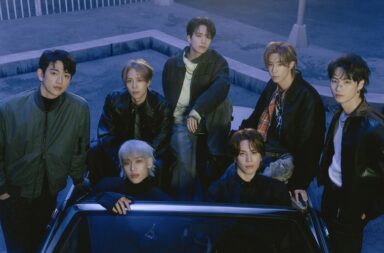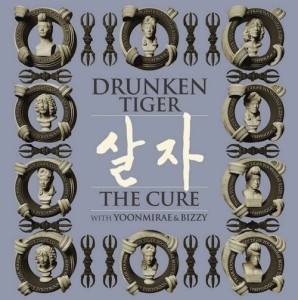 After a four-year hiatus and hot on the heels of Tiger JK’s departure from Jungle Entertainment, Drunken Tiger returns with The Cure, the “group”’s ninth release. Despite the pioneering hip hop collective’s dwindling membership, the last cat standing still recognizes the strength in numbers, enlisting the help of his favorite collaborators: Yoon Mi-rae and Bizzy, and to great commercial success. The nine tracks that comprise the album have dominated the South Korean charts since their release. But while The Cure is a force on the charts—and it pains me to say this because usually, all things Tiger are on point—many of the album’s tracks lacks that signature Tiger JK oomph. Moments of swagtastic brilliance are outnumbered by sappy mediocrity. Sadly and despite rich source material, with The Cure, Tiger is a bit toothless.
After a four-year hiatus and hot on the heels of Tiger JK’s departure from Jungle Entertainment, Drunken Tiger returns with The Cure, the “group”’s ninth release. Despite the pioneering hip hop collective’s dwindling membership, the last cat standing still recognizes the strength in numbers, enlisting the help of his favorite collaborators: Yoon Mi-rae and Bizzy, and to great commercial success. The nine tracks that comprise the album have dominated the South Korean charts since their release. But while The Cure is a force on the charts—and it pains me to say this because usually, all things Tiger are on point—many of the album’s tracks lacks that signature Tiger JK oomph. Moments of swagtastic brilliance are outnumbered by sappy mediocrity. Sadly and despite rich source material, with The Cure, Tiger is a bit toothless.
Drunken Tiger’s last release, 2009’s Feel gHood Muzik: The 8th Wonder, was a master class in how to spit fire better than a snuff-chewing dragon. With gritty, indie hip-hop beats that always went hard, never went home, fresh, inventive rhymes, guest spots from a veritable who’s who in K-hip hop, and emotional realism and sentimentality sans schmaltz, Tiger’s last effort set the bar exceedingly high. Fast-forward four years to The Cure, an album as heartfelt in intent, if not more so, as Tiger JK cites as inspiration his bout with a crippling neurological condition, his father’s serious illness, and other near cataclysms that momentarily robbed him of his will to live.
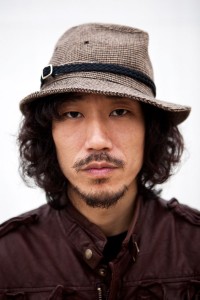 But, with the album’s few forays into down tempo, emotional territory, it falls flat in execution. Gone are the acid flows, endless cool, and sick production of 2009, swapped with roots reggae-inspired wailing placed seemingly inappropriately atop poppy, formulaic, sometimes corny, and sometimes just plain bad backing tracks. (Please don’t hurt me, Mr. Seo.) The emotional sentiments are as hackneyed as the beats, not because Tiger JK comes from a place of insincerity, but because the audience has been there, done that, and come home with the t-shirt. The dominant theme in The Cure is holding onto optimism in the face of hardship and misery. We’ve seen this message so many times, especially in school, very special episodes of (insert sitcom name here), greeting cards, and on motivational posters, that it loses its ability to compel us, especially in songs without a solid musical backbone. Of the nine tracks on the album, the best are the ones about going H.A.M., not taking heart.
But, with the album’s few forays into down tempo, emotional territory, it falls flat in execution. Gone are the acid flows, endless cool, and sick production of 2009, swapped with roots reggae-inspired wailing placed seemingly inappropriately atop poppy, formulaic, sometimes corny, and sometimes just plain bad backing tracks. (Please don’t hurt me, Mr. Seo.) The emotional sentiments are as hackneyed as the beats, not because Tiger JK comes from a place of insincerity, but because the audience has been there, done that, and come home with the t-shirt. The dominant theme in The Cure is holding onto optimism in the face of hardship and misery. We’ve seen this message so many times, especially in school, very special episodes of (insert sitcom name here), greeting cards, and on motivational posters, that it loses its ability to compel us, especially in songs without a solid musical backbone. Of the nine tracks on the album, the best are the ones about going H.A.M., not taking heart.
The Cure starts off with “Beautiful Life,” a hip hop-infused pop ditty that, well, on the plus side, achieves its goal of sounding like an ode to the splendor of life’s deepest joys without you knowing what the words mean. Featuring a simplistic and well-worn, yet radiant melody similar to that in “After You Fall Asleep” from Taeyang’s Solar album (and roughly five trillion other songs), Yoon Mi-rae’s sky-reaching vocals give the song its pneumatic quality. While the flows aren’t sick, they’re decent enough—perhaps they have a niggling cough or a tummy ache. The constant change of voices, a nice touch, keeps the song dynamic.
On the minus side, the track is insipid and somewhat amateurish-sounding. (That cut so deep, it might need stitches. I’m sorry.) Clichéd sentiments and an all-too-familiar song structure give “Beautiful Life” little emotional impact. The 808 drum machine-generated percussion—a hip-hop staple overused to the point of abuse in wannabe hip-hop pop music, and keyboard piano are the most prominent instrumental characteristics of the song, but they lack polish. A bored teenager with Garage Band and a free Saturday afternoon could replicate their sound with little effort. I’m sorry to say, despite being a hit as far as sales are concerned, this song is an artistic miss and a half.
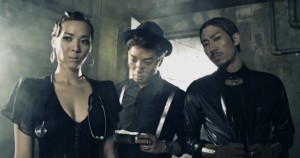 Next up is “Time Travel,” a 5000% upgrade in cool from “Beautiful Life.” Laid back and jazzy, the track mixes indie hip-hop and neo-soul to create an exemplar of hybrid vigor. The crew waxes nostalgic in this shout out to their pre-fame days, with chilled verses punctuated by allusions to rap classics—the chorus is a riff on The Pharcyde’s “Back in the Day” and Yoon Mi-rae hits us with a “Fu-Gee-La”-inspired interlude (or Teena Marie-inspired, depending on how much ‘80’s Soul Train you’ve watched). The song’s smooth R&B sound reminiscent of francophone neo-soul outfit, Les Nubians and funky baseline, coupled with an unembellished hip-hop beat imbue it with a maturity, while keeping it what the kids are calling “dope” nowadays. Drunken Tiger gives titans of the rap game whose bread and butter is this marriage of jazzy sophistication and classic hip-hop sensibility, like Q-Tip and Talib Kweli, a run for their money. This song spells redemption for the album after a shaky start.
Next up is “Time Travel,” a 5000% upgrade in cool from “Beautiful Life.” Laid back and jazzy, the track mixes indie hip-hop and neo-soul to create an exemplar of hybrid vigor. The crew waxes nostalgic in this shout out to their pre-fame days, with chilled verses punctuated by allusions to rap classics—the chorus is a riff on The Pharcyde’s “Back in the Day” and Yoon Mi-rae hits us with a “Fu-Gee-La”-inspired interlude (or Teena Marie-inspired, depending on how much ‘80’s Soul Train you’ve watched). The song’s smooth R&B sound reminiscent of francophone neo-soul outfit, Les Nubians and funky baseline, coupled with an unembellished hip-hop beat imbue it with a maturity, while keeping it what the kids are calling “dope” nowadays. Drunken Tiger gives titans of the rap game whose bread and butter is this marriage of jazzy sophistication and classic hip-hop sensibility, like Q-Tip and Talib Kweli, a run for their money. This song spells redemption for the album after a shaky start.
And then “The Cure,” the title track from the album, comes in to zap the cool into oblivion like a microwave. It’s understandable that the song’s heavy subject matter prevents it from being a party-starter. But trite sentimentality fills the void that cool left. Again, this is not because the artists aren’t sincere, but because the message is overdone. “The Cure” doesn’t offer a fresh take on optimism in the face of despair. It uses words and sounds so stale that they move past the point of accessibility to near-emptiness. It’s a tall task for anyone to avoid this pitfall when a message so fundamental as to be common is the inspiration for your art. But it’s especially difficult when the tools you use are hard to take seriously.
[youtube http://www.youtube.com/watch?v=uQLndQKf8k4]Sonically, the song is like so many formulaic “kumbaya” copycats pursuing rooty profundity but falling short. It opens with what proves to be its strong suit—Yoon Mi-rae’s sweet, simple vocals, and acoustic guitar provided by YouTube sensation, David Choi. The djembe-based beat drops and in comes Tiger JK’s reggae-tinged talk-warbling. The song trudges on as heads sway around the bonfire, the music exacting its telekinetic power over my eyeballs, causing them to roll against my best efforts not to be cynical (or at least show cynicism). I know everyone involved is completely sincere, yet my irises still make their way skyward. The highlight of the song is the infectious giggle of Yoon Mi-rae and Tiger JK’s painfully adorable son, Jordan, at the end. Way to clutch it, kid.
Dedicated to Tiger JK’s father, music journalist Seo Byung-hoo, who’d undergone treatment for cancer, “The Cure” takes a stab at being poetic in a truly heartfelt effort, but the lyrics don’t succeed at being moving, resembling those of other songs with similar messages. The chorus offers a prime example of the stock lyrics the song is serving up.
It’s a Cold Cold World Out There
Sometime I Feel As If Nobody Cares
I‘m Down Down Down
Can Somebody Save Me Now
While the fantastically melancholy and beautiful MV are a value add, the song itself just doesn’t do it for me. Maybe I’m unfeeling and if you see things differently, please let me know. (With your words, Tiger JK. Please don’t trouble your fists for this communication.)
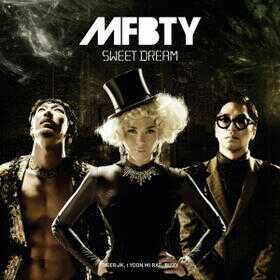 Enter two familiar faces. From the MFBTY EP released earlier this year, “Sweet Dreams” and “BizzyTigerYoonmirae (MFBTY)” get things hyped. The former is a banger steeped in progressive house, that builds to an electronic-sounding, synth-heavy crescendo at the chorus, then drops into a dirty hip-hop beat that the three masterfully do verbal acrobatics over like gymnasts during the floor exercise. Fire-spitting makes a triumphant return! The latter is probably the hardest K-hip hop track of the year. Nobody is badmouthed and yet everybody else in the game basically gets manhandled when you compare their output to this song. Straight, grimy hip-hop, with a base-heavy beat and stripped down sound, the production provides the perfect platform on which Bizzy, Tiger JK, and Yoon Mi-rae to murder it, which they do handily, especially Tiger, who absolutely savages the track. Thanks for bringing the heat, y’all. It’s getting chilly in the Northern Hemisphere!
Enter two familiar faces. From the MFBTY EP released earlier this year, “Sweet Dreams” and “BizzyTigerYoonmirae (MFBTY)” get things hyped. The former is a banger steeped in progressive house, that builds to an electronic-sounding, synth-heavy crescendo at the chorus, then drops into a dirty hip-hop beat that the three masterfully do verbal acrobatics over like gymnasts during the floor exercise. Fire-spitting makes a triumphant return! The latter is probably the hardest K-hip hop track of the year. Nobody is badmouthed and yet everybody else in the game basically gets manhandled when you compare their output to this song. Straight, grimy hip-hop, with a base-heavy beat and stripped down sound, the production provides the perfect platform on which Bizzy, Tiger JK, and Yoon Mi-rae to murder it, which they do handily, especially Tiger, who absolutely savages the track. Thanks for bringing the heat, y’all. It’s getting chilly in the Northern Hemisphere!
Newly powered up with some hip-hop energy, the album finally finds its feet and takes off running. Track six, “All In Together,” is an up tempo thumper with a grinding, industrial baseline, electronic bongo percussive accents, and a melody that sounds like an audio expression of B-movie calamity. Tiger and crew lay down one spirited verse after another, some venturing into cartoonish territory. “All In Together” presents a convincing case for you to get on the dance floor.
 Next is “Go,” another sweet hip-hop track taking its cues from dance music. Starting in rather dramatic yet subdued fashion with piano, then military snare drum and Yoon Mi-rae’s tentative voice, for a moment you think the album has returned to the slower tempos and more serious sentiments of earlier tracks. Fooled you! Energized vocals, samba whistles, and expectant percussion set things off. A minimalist hip hop beat drops along with Tiger JK’s rhymes. The song returns to the subdued military sound for the chorus, then upbeat dance hip-hop takes over again. “Go” offers evidence that corroborates “All In Together”’s assertions that you should be on the dance floor. The argument for shaking what your mama gave you grows stronger. “Get It In” maintains the dynamism as the album reaches the home stretch, although with a hint of melancholy. The verdict is in. You must drop it like it’s hot!
Next is “Go,” another sweet hip-hop track taking its cues from dance music. Starting in rather dramatic yet subdued fashion with piano, then military snare drum and Yoon Mi-rae’s tentative voice, for a moment you think the album has returned to the slower tempos and more serious sentiments of earlier tracks. Fooled you! Energized vocals, samba whistles, and expectant percussion set things off. A minimalist hip hop beat drops along with Tiger JK’s rhymes. The song returns to the subdued military sound for the chorus, then upbeat dance hip-hop takes over again. “Go” offers evidence that corroborates “All In Together”’s assertions that you should be on the dance floor. The argument for shaking what your mama gave you grows stronger. “Get It In” maintains the dynamism as the album reaches the home stretch, although with a hint of melancholy. The verdict is in. You must drop it like it’s hot!
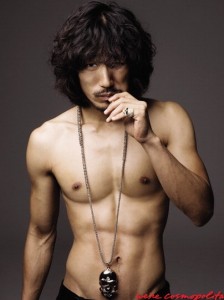
The final track, the reggae-version of “The Cure,” definitely kills the buzz created from the previous few songs, but it is an improvement from the original version, taking the song from “sheesh” to “meh.” The addition of organs, electric guitar and the ska upstroke (a basic feature of reggae), and rhythmic vocal backing make the song sound a little more like Toots and the Maytals, and a little less like that obnoxious university kid at your hostel in Costa Rica singing Jamaican protest songs with the acoustic guitar he brought on an international flight because of music.
In terms of quality, The Cure is a mixed bag. While some songs go thump in the night, others put you to sleep. The earnest sentiments of the star tracks–“The Cure” and “Beautiful Life”–may ring true in real life, but it rings hollow in art without an infusion of freshness and if dependent upon trite expression. However, with an oeuvre on the whole as brilliant as Sirius and talent for days, Drunken Tiger should follow its own advice: be optimistic for the future, which holds the promise of greatness.
(YouTube[1][2][3][4][5][6][7][8][9][10][11][12][13][14][15], Images via FEELGHOOD music, Jungle Entertainment)


